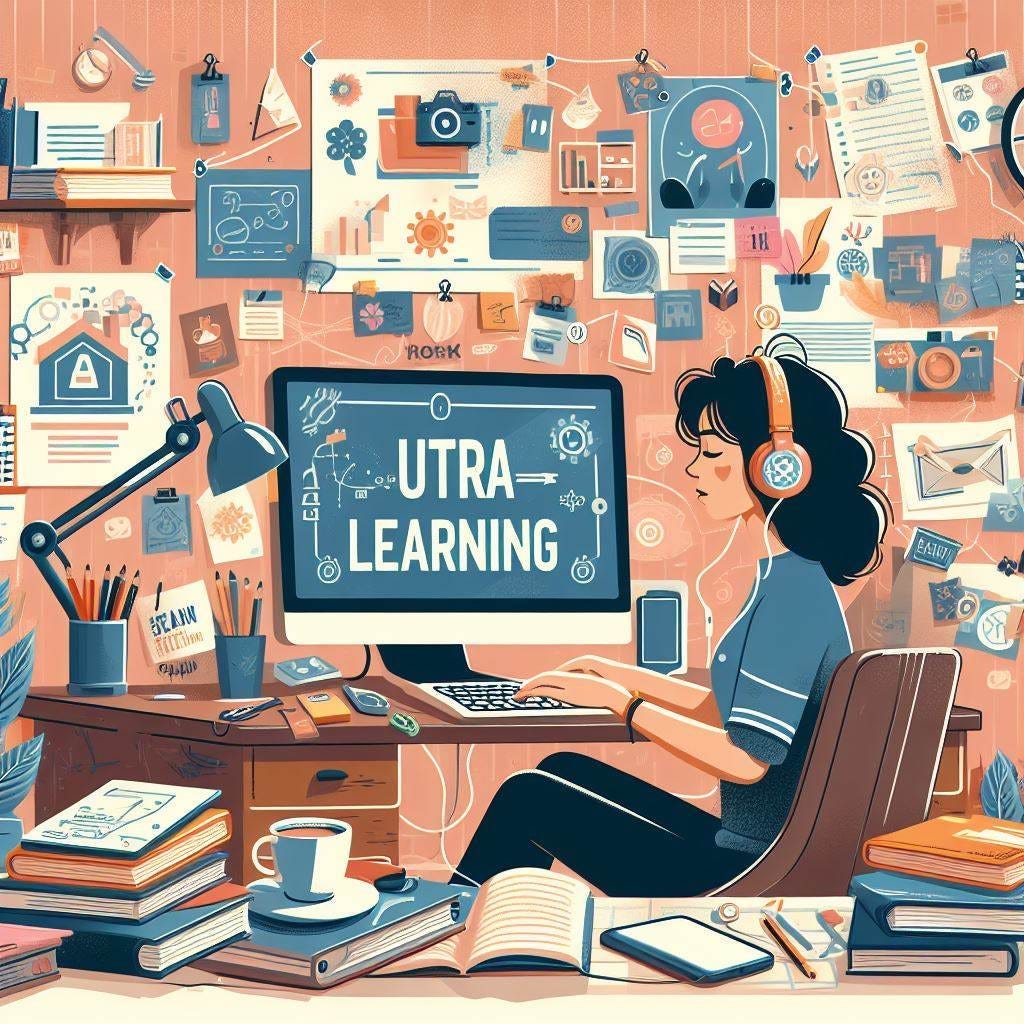Learning is a superpower.
However, I didn’t have the money and time to enroll in another degree or take more courses. This saddened me, as I wanted to learn about many topics like a new language, programming, math, neuroscience, animal cognition, writing, etc.
Everything changed when I embraced ultralearning, without noticing it.
I learned how to self-learn effectively on any topic. This made me save money, and time while also improving my mental health by reducing stress. I could ace my exams while learning more skills to become a scientist.
Let me show you what ultralearning is and how you can use it to save your career.
What Is Ultra Learning?
It is a strategy for acquiring skills that are both self-directed and intense.
It was popularized by Scott Young in his book “Ultralearning: Master Hard Skills, Outsmart the Competition, and Accelerate Your Career.” In a nutshell, it involves applying 9 principles to organize, practice, and master hard skills.
Scott’s most popular ultra-learning project is the MIT challenge.
There, he finished a computer science degree from MIT in just one year! For this, he used the resources provided by MIT Open Course Ware, including lectures, exams, and programs.
Not only did he save time but money.
And so can you. You can apply ultra learning for anything you want to study (a degree, skills, a new language, etc) or at your job. Being able to learn, adapt, and solve problems easily and quickly is a gold skill that every employer will value.
But there are more benefits.
3 Benefits Of Ultra Learning
1. Save (a lot of) Money.
Tuition fees for universities or some interesting courses are too expensive.
By doing ultralearning, you can take all the great free resources on the internet available for you and learn them without paying a single cent.
2. Save (a lot of) time
You can study at your own pace.
You don’t need to go to school or college or follow a regular schedule. You’re free to choose your times.
By doing this, you can accelerate, transition, and rescue your career with ultralearning.
3. A Hidden Advantage in a Competitive World
There are new frontiers of learning.
To be able to solve problems efficiently, to adapt, and to learn whatever they ask of you is a gold skill that every employer will love.
How To Become An Ultra-Learner Using Its 9 Principles
Scott Young proposes 9 principles to start right away with this:
Meta-learning: learn how your knowledge is structured, and draw a map for the topic you wanna learn. In other words, learn how to learn it.
Focus: make time to concentrate and study. Focus only on that, make it a habit.
Directness: learn by doing the thing you want to become good at.
Drill: isolate a weakness in your learning and concentrate on it.
Retrieval: recall the information you learned.
Feedback: Try to get feedback from others and work on it.
Retention: understand what and why you forget. Improve your encoding.
Intuition: Understand how understanding works. Focus on examples in context.
Experimentation: explore outside your comfort zone. Apply your knowledge in other contexts.
2 Ultra Learning Projects
Note that ultra-learning main benefit is also its main weakness.
The reason is that you are responsible for your learning success. So make sure to decide what you want to learn, and how you want to learn it. Make your roadmap (meta-learning, principle 1) and start learning what you need.
Below are 2 ultra-learning projects to motivate you.
1. Learning a Degree
There are many excellent free resources available on the internet.
Some of them include lectures from MIT, one of the best universities in the world. Platforms like Coursera or EdX also offer courses from other top universities and companies like Google or IBM (most of them for free.)
Here are some links to organize your project:
MIT resources: https://ocw.mit.edu/
MIT lectures: https://www.youtube.com/@mitocw
Open Source Society University (Computer Science Degree): https://ossu.firebaseapp.com/#/curriculum
Open Source Society University (More Degrees): https://github.com/ossu
Use these links to apply the meta-learning principle.
2. Learning a New Language
Learning a new language is also a top skill.
During the pandemic, I decided to learn German by using the Deutsch Welle course called “Nico’s Weg“. It is organized like any language course and includes A1, A2, and B1 levels.
Each level has 18 chapters, so by studying 1 per day you could go from 0 to B1 in just 2 months.
Of course, that pace is extreme, so I would recommend taking it easier.
Ultralearning saved my career.
It helped me learn anything without overstudying or overworking. But remember, each person has a different life. Perhaps you work full time and also study. Or maybe you have a family, etc.
Be reasonable and don’t fall into toxic productivity.
Here are some last recommendations:
Don’t compare yourself with others. Take your time.
This is not a competition. This is about you. Make it fun and healthy.
Please take care of yourself. That’s the most important thing!
I hope you can achieve your goals with my secret career technique now.
And I hope you love ultralearning as much as I do.
Some Questions For You
What do you want or need to study?
Is there anything you always wanted to study but never tried or gave up?
How would you use ultra-learning in your project?
In the next post, I will write about each ultra-learning principle and how to structure your projects. Stay tuned!
Until the next time,
Axel





Good post. I always have worries about these books and the miracle methodologies of "how to do something better", but I will try that. I am learning English. It is difficult for me. But I will follow your advice. Thanks